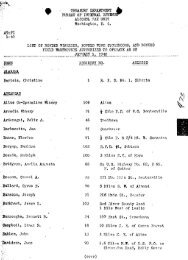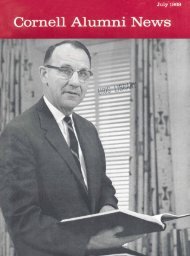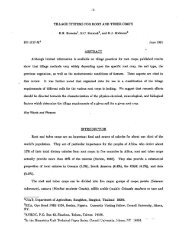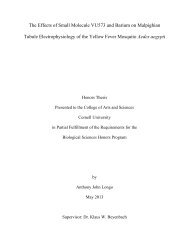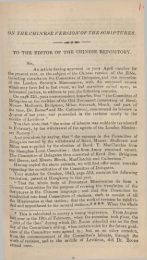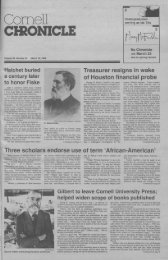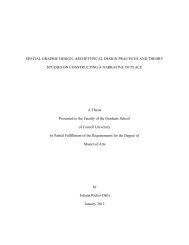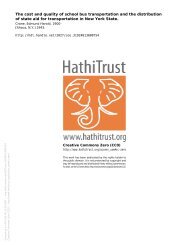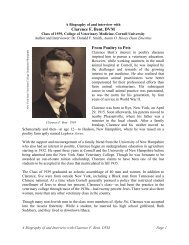1/1 - eCommons@Cornell - Cornell University
1/1 - eCommons@Cornell - Cornell University
1/1 - eCommons@Cornell - Cornell University
- No tags were found...
You also want an ePaper? Increase the reach of your titles
YUMPU automatically turns print PDFs into web optimized ePapers that Google loves.
ΊT GOES WITHOUT SAYING THAT SO MANY WILL GO TO THEIR<br />
GRAVES HAVING NEVER BEEN CALLED TO ACCOUNT FOR WHAT<br />
thousands of World War II files are<br />
becoming available for the first time<br />
to U.S. investigators. Sher expects<br />
them to be a major boost to the<br />
OSΓs work. But with the Holocaust<br />
Conrad Schellong, deported<br />
now nearly 50 years old, its surviving<br />
perpetrators are entering the<br />
final years of their lives. "Time<br />
is our biggest enemy," Sher<br />
notes with some regret, "and<br />
there's nothing we can do about<br />
that."<br />
Sher spent much more time<br />
hunting Nazis than he thought he<br />
would when he joined the OSI.<br />
Raised in Queens Village, New<br />
York, Sher learned about the Holocaust<br />
more through reading than<br />
through the personal experiences of<br />
his Jewish family. (Sher's father,<br />
Benjamin, was wounded in World<br />
War II.) After graduating from the<br />
School of Industrial and Labor Relations<br />
in 1968 and New York <strong>University</strong><br />
Law School in 1972, he<br />
moved to Washington, DC, where<br />
he served as a law clerk and then<br />
spent six years with a small law<br />
firm, Cole and Groner, which specialized<br />
in federal litigation. In 1979,<br />
he joined the year-old OSI as a senior<br />
trial attorney and six months<br />
later was named deputy director, in<br />
charge of all litigation. In 1983 he<br />
became the office's director.<br />
When Sher took charge of the<br />
OSI, he predicted that the office<br />
would be around just five to seven<br />
more years. The biggest reason was<br />
the age of defendants, which Sher<br />
calls "the biological statute of limitations,"<br />
but there were also ques-<br />
tions about how many investigations<br />
would yield viable cases. Now,<br />
nearly 11 years later, Sher makes<br />
the same prediction: five to seven<br />
more years. "No one expected the<br />
office would be around this long,"<br />
he says. "No one expected we'd<br />
bring this many cases, no one expected<br />
that we'd find so many individuals<br />
in the United States, and no<br />
one expected that we'd be as successful<br />
as we have been in winning<br />
our cases in court."<br />
As a trial attorney, Sher won the<br />
first OSI case to reach court, in<br />
1980. His target was Wolodymir<br />
Osidach, a Philadelphia man accused<br />
of directing the murder of Jews<br />
while he was police chief in the<br />
Ukrainian town of Rava-Ruska. Sher<br />
spent five weeks in Ukraine taking<br />
videotaped depositions from witnesses—the<br />
first time, he says, that<br />
a federal prosecutor planned a case<br />
around videotaped testimony. The<br />
court admitted the evidence and<br />
eventually ordered the removal of<br />
Osidach's citizenship. Osidach died<br />
while appealing the decision.<br />
Sher ranks that case among the<br />
office's most significant victories because<br />
the decision seemed to sanc-<br />
CORNELL MAGAZINE<br />
38<br />
tion the OSΓs methods. He also<br />
points with great satisfaction to the<br />
investigation of Arthur Rudolph, a<br />
German scientist welcomed into the<br />
United States as part of President<br />
Harry S. Truman's so-called "Paperclip<br />
Project." Under that program,<br />
German scientists deemed potentially<br />
valuable to the United States<br />
in its post-war technological race<br />
with the Soviet Union were given<br />
special treatment as war refugees.<br />
Government investigators marked<br />
the files of those men with<br />
paperclips to alert officials that they<br />
should be allowed into the United<br />
States.<br />
In theory, even desirable German<br />
scientists were to be turned<br />
away if they were former Nazi war<br />
criminals. But as several investigations<br />
have concluded, that guideline<br />
was routinely ignored by eager military<br />
officials. Such was the case,<br />
Sher says, with Rudolph, who had<br />
served during the war as operations<br />
director of Germany's Mittelwerke<br />
V-2 rocket assembly plant. Rudolph<br />
ordered the delivery of slave laborers<br />
to the facility from the nearby<br />
Dora concentration camp and literally<br />
worked tens of thousands of the<br />
prisoners to death, says Sher, adding,<br />
"It's just a classic case of a man<br />
who exploited his talents for evil."<br />
In 1982, OSI officials confronted<br />
the retired Rudolph about his wartime<br />
use of slave labor. Admitting<br />
he requisitioned the prisoners,<br />
Rudolph agreed to give up his U.S.<br />
citizenship and departed for Hamburg,<br />
Germany. To those he calls<br />
Rudolph's "apologists," who now<br />
claim the scientist was coerced into<br />
the agreement, Sher insists that he<br />
was present when Rudolph agreed<br />
to the conditions and that Rudolph<br />
went so far as to negotiate the wording<br />
of the OSI press release announcing<br />
the deal. Rudolph even demanded<br />
that Sher be present when<br />
he left the United States for good,<br />
Sher says. "I watched that big<br />
Lufthansa flight take off with that<br />
Nazi SOB on it," he recalls.



